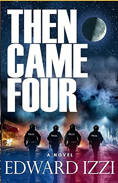
 |
Detroit in the late 1960s is a hotbed of unrest. The city’s dominant industry, car manufacturing, is unstable. With unemployment on the rise, so is crime. At the same time, Vietnam War protests and civil rights movements garner the energy of citizens who see the underlying causes of these related issues and want change. But the Detroit police, under “the tac squad,” maintain the status quo with a heavy hand.
Four of its officers, The Big Four, grew up in immigrant households scraping to get by. As kids, they fought with blacks also living in poorer neighborhoods. As men, they continue to see blacks as an enemy on whom their jobs allow them to take out their anger. On the other hand, two recent law school graduates, Wesley and Tony, and an up-and-coming journalist, Joanne, use their positions of power to fight for justice for the death of a black prostitute and subsequent other deaths of black people whom they suspect the police murder.
The story’s slow build works to create drama and suspense. The police officers’ ugly vitriol quickly breeds empathy for the black prostitute. As each character is introduced and their stories unfold, so grows the question of how all these figures will relate. After the police and Joanne meet, the pace picks up. Depicting violence, romance, and political collusion, short chapters race toward a riveting final court case coinciding with Tony and Joanne’s marriage. The political collision with personal lives demands the reader’s total engagement. Tony’s change of heart is the book’s takeaway. As his smugness no longer makes sense, readers, too, see the world with new insight because of this novel.